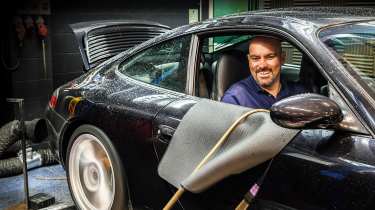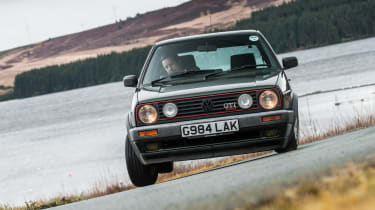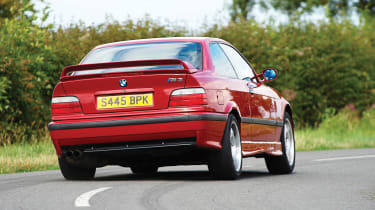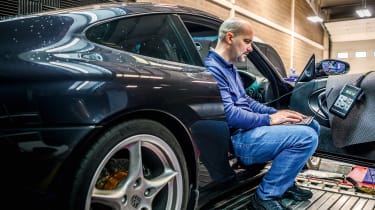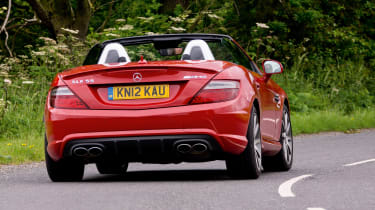My Life & Cars – Rob Young, Founder, DMS Automotive
His skills in microelectronics enabled Rob Young to establish one of the UK’s most successful performance upgrade businesses – and indulge his own passion for cars
'I was always into cars. My dad loved driving, and we’d go on our holidays to Spain. We had an apartment in Majorca, and Dad used to drive there, so I’d sit in the back and be car spotting. From six years old it was all about the 911 Turbo with the big whale tail [the 930] – that’s what I wanted from being about knee-high. Not a Ferrari.
When I was about 14 my dad taught me how to drive, in Spain. My first car was a 957cc Ford Fiesta, with 39bhp. I was sure it had lost some of that power, so I bought a Haynes manual and took the cylinder head off, jet washed it all out, ground the valves back in with paste, and put it all back together in the back garden, hoping I’d get back the power. I was power hungry even then…
> My Life & Cars – Martin Brundle, Racing driver and F1 commentator
Microelectronics is my trade, but I was applying it to some pretty boring stuff after my education. I spent all the money I had on cars. I had a Mk2 Golf GTI 8v, then a 16v, followed by an E30 325i M Sport in 1991, with the big bumpers, then an E36 325i for about a week, and then a 1994 3-litre E36 M3. It was that car I sold in 1997 to start this business.
Before then, working hard was all about ‘what else can I buy for my car?’ That was how my mind worked. I always wanted to do more with cars, but I had no idea how to run a business with them.
At my previous employer I completed a three-year degree in just two years, and took unpaid leave to do all the coursework. However, after all that work they tried to wriggle out of giving me the pay rise they’d promised. I was so disillusioned about working in a big corporation that I left with no idea about what I was going to do next. Either I had to find another job or this was my time to start on my own, and I decided on the latter.
Like many, I made lots of mistakes to start with, but eventually you get the hang of it, and one thing I soon realised was that without your customers you have no business, so you have to cater for what they want. And if you’re doing something that you’re really passionate about then it’s a real advantage – and I really love cars!
I went from having my M3 to just a van – most of the time you have to go backwards first to go forwards. After the first two years we then started to grow quickly, and I realised I had to stop worrying about it and just get on with it.
Most of all I like to think of myself as a problem-solver. We have seven staff members currently, including my brother Tony, and two sites with three rolling roads – two at our Southampton HQ, one at our West Midlands branch. I’ll do mechanicals if I have to, but my experience is software and the electronics, and understanding the whole problem. If someone is better at a job than me then I’ll get them to do it, and that’s why I love working with people such as Mariusz, one of our techs, because he understands the mechanical side in a way I don’t. For example, we had a Carrera GT here, and there was a bearing that Porsche said you couldn’t buy – you need to buy a new gearbox.
So Mariusz got a new sleeve for the bearing made in Poland, and then we stripped it out on the bench – and there’s no handbook for that car – and put it all back together. I love starting with a problem, even if it’s really stressy, and then getting to the solution.
Back in the era of the Sierra Cosworth when everyone was tuning them, they’d put a stronger spring on the actuator and then alter the fuelling within the ECU. Before that, with set-ups such as Bosch K-Jetronic, air was drawn through a flap with a potentiometer on it and you’d just bend the flap. But the thing that really set us off being particularly busy was around 1998/99 when electronic control systems really began to develop. Something such as a Porsche 993 Carrera had a simple 28-pin chip that you plug in, the kind that was in all sorts of machines and very easy for someone to replace.
However, then they went to EPROMs called PLCCs, which are twin square chips soldered to the board, and 16-bit. The technology was crude, and the software was beyond that of the hardware, so you’d have two chips, high-bit and low-bit. Those were physically hard to work with; forget about the software, which was basic anyway, actually desoldering those chips off the board, making sure you read them correctly, programming new chips and then resoldering them back on the board without damaging any of the delicate circuit board tracks was really difficult. However, that’s my background – that for me is baking bread in a bakery!
So suddenly hardly anybody could tune all these new ECUs, and not only did I have the direct work for customers, I’d have other companies sending me an ECU, I’d do it for them, and they’d even give me the software, and then I’d do the turnaround. I did that for the first year, and then we worked exclusively for us after that. Now there is so much depth to the software, there’s so much that you can do with different maps and the technology.
Another big thing for us was when someone rang up one day and said: ‘I’m from the Ferrari Club Singapore, can you tune these cars?’ Manufacturers were making a separate spec for hotter climates, often with less power, so there was a big grey import scene and those cars were going wrong – they’ve only got 95 RON to run on over there, so suddenly we were doing Ferrari F355s and 550s, detuning them to run on their fuel. Who in their right mind would take a chance and go out there? But sometimes it’s realising that not everything will work out and that if something does go wrong then having the ability to just let go of it and move on. Then we hit the 2008 recession. In August 2008 we had 50 cars a week in here, by October we had just three cars a week. That’s when you realise to really appreciate your customers and never take things for granted.
I have cars that are my passion, and then cars that are ‘work cars’. For the former, my first Porsche arrived in 2001, a 996 C4 with factory aero kit – Arctic Silver with Metropole leather. I really liked it at the time. And then I got my dream car, the 996 Turbo. That’s a car I should never, ever have sold. However, I still have my 997 Turbo – a GT2 RS lookalike with 900bhp – and that is simply my ideal Porsche, plus some others. Amongst those are an SLK55 AMG that my wife still drives, and a Mk3 Golf VR6, the last of the line with no plastic wheelarch trims that we bought in 1997 nearly new – I can’t bring myself to sell it. I have a McLaren 650S GT3 car that I race occasionally; I don’t do much, but it’s just a reward for working hard and I really enjoy it. I haven’t gone out and bought a load of cars, I just haven’t really sold many…
For work, with something such as the current F90 M5, I knew if I could wait another couple of months I could save twenty grand on buying one, but then I could lose 50 customers, so I had to go and commit. I needed an active cruise control car and one with active steering too, because these days you need to understand how all the electronics are integrated before tuning them, plus I needed a non-OPF [Otto Particle Filter] car. The non-OPF car has all the wiring and all the connectors for the OPF, it’s just all blanked off, so the hardware is the same, and I can then fully understand how it all works. This is really important now since September 2018 and the emissions regulation changes. There were only two cars in the UK that matched that spec, and I bought one of them – I love it, but when it goes I’ll have no sentimentality attached to it. There are so many new cars coming now, I can’t buy all of them for work, but I know I can ignore some cars for the moment, until they hit the sweet spot value-wise and then the demand for tuning will be there.
We do tune some hybrids but the whole EV thing doesn’t interest me. I couldn’t wake up in the morning and work on EVs, I’d be lying to myself, which is the same reason we don’t tune Nissan GT-Rs.
With something such as a Porsche 993 or 996, how can it date? It’s like an old Hasselblad, it’s still a nice thing to have. An iPhone 5? Who wants that? Electric cars will be disposable, I think, but petrol engines have character and there’s enough great cars out there already to keep us busy for the foreseeable future.’

